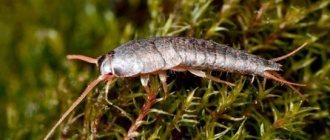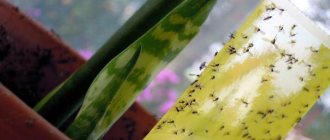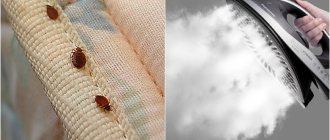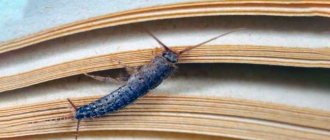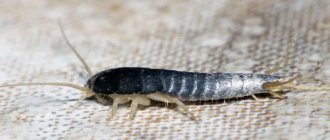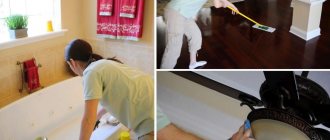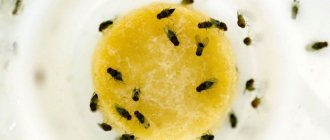A person treats flying insects in his home more or less calmly, but he always feels disgust towards crawling ones. Especially when these “neighbors” appear in the most unexpected place, have a repulsive appearance and an unknown name.
Sometimes uninvited guests look like agile silvery fish fry with many legs and antennae. This is just a silverfish - a photo of such an insect is easy to find on the Internet. It is harmless to people, but it is still not worth encouraging the breeding of such arthropods in the house. It is necessary to determine the reasons for their appearance and take the necessary measures. If silverfish have settled in your bathroom, our article will tell you how to get rid of it in effective ways.
Who are silverfish?
When a person discovers these “aliens” in his home for the first time, he feels confused. Activating after dusk, hordes of small centipedes scatter from under their feet, frightening the homeowner. During the day, fortunately, it is almost impossible to see them.
Silverfish are nocturnal insects. This is the time of day when they are most energetic. Pests can live in any building, migrating between apartments and houses through ventilation systems, making their way through cracks and crevices, traveling on animals. But sometimes they start after being brought from a store with food, things or plants. People call them “silverfish” and even “woodlice”. But they are similar to the latter only in the larval stage - both are convex and round.
There are many types of silverfish. Among them there are ordinary (sugar), domestic, comb, etc. Some representatives even inhabit anthills. Moreover, the ants do not react in any way to such a neighborhood, and sometimes they feed their “guests” with a sweet secret.
Common domestic species include sugar silverfish and house thermobia.
The common silverfish (or sugar, white) is a large insect. It can grow more than 1.5 cm in length. Its body is covered with wide, tightly fitting scales. It has no wings, but it quickly runs across the floor and walls. An adult silverfish has a gray shell with a slight silver tint, or almost white. This species prefers to live in rooms with high humidity: bathrooms, basements and other damp places.
Home thermobia
Thermobia is a type of silverfish. It can grow up to 13 mm, which is slightly smaller than the size of sugar. The carapace is colored uniformly brown. The insect chooses warm rooms rich in food supply. These include warehouses, kitchens, storerooms. Thermobia happily eats floury products and polysaccharides. Females are very fertile, laying up to fifty eggs at a time. The lifespan of an arthropod is on average three to five years.
Methods of combating this species are more gentle than the usual ones, because it lives among food products, so the use of aggressive chemicals is prohibited.
Woodlice
These insects have an oval body of light gray, white, beige or brown, convex on top, and consists of several segments. The bug has 7 pairs of legs and a hard shell, and in front there are antennae up to half the length of the body. In nature, woodlice love damp places, which is where they got their name, but sometimes they settle near human habitation. They can climb into the cellar and into some rooms in the house (bathroom or toilet) where there is high humidity.
You can see such insects in the toilet or bathroom only when you turn on the light at night, because during the day they hide in secluded corners. Woodlice feed on plant debris and can harm plants in the garden. Inside residential premises, they can live not only in the bathroom and toilet, but also in living rooms where there are decorative flowers in pots. Here they find not only water, but also food.
Penetrating into living spaces, woodlice can not only frighten people who are disgusted by insects that run quickly, but due to moisture and mold they become carriers of various fungal diseases, which pose a danger to human health.
Therefore, it is imperative to combat such moisture-loving insects, taking all possible measures to destroy them.
Reasons for the appearance of insects in the bathroom
When silvery insects start crawling in the bathroom, few people enjoy it. Therefore, a person tries to get rid of any manifestation of activity from uninvited guests.
But still, before you start fighting the pest, it doesn’t hurt to find out how and why the silverfish has occupied your home. So, the main reasons for the appearance:
- Ideal conditions. Usually, sugar silverfish can grow where there is an atmosphere favorable for it in the room. Since the insect prefers dark, secluded places with high humidity, the bathroom becomes an ideal habitat for it.
- Ventilation holes. The centipede most often runs into the apartment from neighbors.
- Cracks, crevices, dilapidated housing. If you are a fan of wooden window frames, then sooner or later they may collapse from exposure to external conditions. Then cracks and crevices appear in the structures, through which insects can easily enter the home.
- Accidental hit. The bug can be brought from a supermarket, from a spontaneous market, from a workplace, from a walk, from public organizations where there are a lot of paper products (shops, libraries, schools, gardens).
- Construction garbage. If you tend to store unnecessary materials left over from renovations for a long time, then sooner or later you will definitely have a silver coin.
Important: the insect has increased vitality, similar to a cockroach, and can form a large colony over time. Therefore, it is undesirable to delay destruction too much.
Description
It looks like an oblong cone-shaped bug. The wide part is the head with two long antennae. On the sides of the elongated body, covered with armored scales, there are six legs. The tail is crowned with three long threads directed in different directions.
Insects reproduce slowly. In the natural environment, a generation hatches within a few months. Under favorable conditions, adults emerge in about 60 days.
Compared to other household pests, silverfish pose the least danger. Since they live in large families, an accidentally introduced pair of insects will take a very long time to rebuild the colony. Therefore, a person has enough time to destroy accidentally discovered insects.
How to get rid of silverfish in the bathroom on your own
It's not as difficult as it seems. The main thing is not to stop fighting halfway, otherwise the pests may return.
To start with:
- remove all unnecessary items from the bathroom, clearing corners, baseboards and shelves of clutter;
- wipe the surfaces with a damp cloth using chlorine substances and wait until they dry;
- hard-to-reach places should be treated with a solution of copper sulfate (see “The best remedies for silverfish”);
- It is advisable to dry surfaces washed with chlorinated water using a hair dryer;
- The use of an insecticidal aerosol has a good effect. After this, the room must be ventilated for at least two hours.
Now let’s take a closer look at folk methods, as well as chemical and pharmaceutical preparations for insect control.
The best means
To destroy a pest, several different substances are usually used: during the disinfection period, the toxic liquid should be alternated. There are some proven chemicals that can be used to poison silverfish. Among them:
- Dichlorvos. An aerosol that effectively fights all types of insects. Ideally, after spraying, the room should be left for 24 hours and then thoroughly ventilated. Typically no re-treatment is required.
- Alum. Dilute 100 g of alum in 100 ml of hot water. Stir until the drug is completely dissolved. Spray the liquid using a spray bottle in places favored by silverfish.
- Boric acid. Make a mixture based on acid and chalk in a ratio of 4:1. It needs to be scattered in places where pest accumulation is possible. After a week, sweep away the powder and add new one. Repeated sprinkling destroys presumably the remaining larvae. After another seven days, the mixture must be finally removed and wet cleaning carried out using aggressive agents.
- Karbofos. It is sprayed evenly on surfaces where silverfish are spotted. It is designed to instantly kill all types of insects that sooner or later appear in any home. It has a long-lasting effect and is affordable. The downside of the drug is its pungent odor.
- Gels. They have a long-term effect on all creeping insects, poisoning them. The products are applied along baseboards, in cracks, and around ventilation holes. A week later, the treatment is repeated.
- Naphthalene. The bags are placed in secluded corners. It has a pungent odor that permeates upholstered fabrics and toys, but is completely non-toxic to humans.
- Diatonite. It consists of diatoms and unicellular shells. The substance is poured copiously late at night. It is advisable to do this wearing a mask. Since diatomaceous earth consists of small, sharp particles, it injures the insect and it dies.
Caution: chemicals (Karbofos and gels) are prohibited from being used in areas where children and animals may appear.
Traps
Traps help consolidate the results after using chemicals. They are also convenient to install in places where it is impossible to use insecticides. For example, in the kitchen, in the pantry, in the basement during the onset of cold weather.
Such products are environmentally friendly and safe. They are small and easy to use, and are absolutely harmless to humans. The following types of traps are produced:
- Detia - a kind of bait for silverfish. It paralyzes their nervous system and has a long-lasting effect (up to 6 months). Sugar or a piece of bread is used as bait.
- Trapper insect trap It is presented in a cardboard box, adhesive on the inside and divided into mini-segments, which are assembled in blocks of 3 pieces each. Performed without the use of poisons. There is an adhesive strip on the back side, thanks to which the trap is fixed in any convenient place. Manufacturers provide a free field for recording installation time. To make it more convenient, the segments can be divided individually and placed throughout the home.
- Trapper max glue resembles the previous version, but there is no division into cells. This is a box with a large area on the surface of which insects stick.
Folk remedies
Traditional methods of eliminating silverfish are still widely popular. However, their effectiveness has not been proven. But they are simple, accessible and practically harmless.
- Wood shavings from cedar. It can scare away insects, but not for long, and only from one specific place. Be prepared that the silverfish will take a liking to the neighboring rooms.
- Chili, tobacco, soda. Three grams of each ingredient are taken. They are crushed and infused in one liter of water for at least eight hours. Then they are strained and sprayed in the pest’s habitats. After six hours, the product is washed off with water with the addition of bleach or vinegar.
- Spices. Bay leaves, cinnamon, sage and cloves prevent insects from appearing in wardrobes and bookshelves. But the smells of spices only repel the parasite for a short time.
- Oil of lavender, lemon, orange. 10 drops are diluted in 250 ml of water. The resulting product is sprayed using a spray bottle in areas of accumulation.
- Fresh cucumbers. Through testing, it was noticed that silverfish cannot tolerate the smell of these freshly cut vegetables. They are placed in the habitats of bugs to repel them.
- Citrus. The pungent smell of crushed zest is a good insect irritant. The grated crusts need to be changed every four days.
- Freezing. Popular rumor advises trying to breed silverfish during the especially cold months of the year. To do this, you should leave your home with the windows open for a period of three to five hours. The method should be repeated several times so that the insect feels threatened and stops reproducing. At the same time, be prepared for the fact that indoor plants will simply die, and an uncomfortable temperature will be established in the house for a long time.
- Newspaper trap. The newspaper is rolled up, the edges on both sides are secured with rubber bands and moistened generously with water. The resulting tube is placed in the bathroom at night. Dampness attracts insects that get inside, all that remains is to get rid of the newspaper (take it away from the house, burn it).
- Glass trap. A liter jar is tightly wrapped with paper tape. At the bottom of the container you need to put a piece of sugar, bread or sprinkle a little flour. The product is also left in the bathroom overnight. Attracted by the smell, the bugs crawl into the jar and cannot get out.
For the sake of “sporting interest”, folk methods can be tried. Just remember that they bring effectiveness with regular use. The described steps must be repeated many times, with a difference of 3-5 days.
Soap based balls
There is another completely unusual way. You can make so-called “soap” balls. They are made on the basis of laundry soap, peroxide and some essential oil. Basically, the following proportions are taken: two tablespoons of grated product, 1/3 cup of hydrogen peroxide, 12 drops of lavender or citrus oil and a glass of soda. The components are mixed and small balls are rolled out of them. To prevent and repel insects, use these pellets to clean the toilet and bathroom twice a week.
Advice: if there is a very large pest infestation, it is better to use the help of special services. Professional treatment of the room with hot or cold fog will solve your problem for a long time.
Bugs in the apartment - photos and names
Woodworm
- The bug is no more than 3 mm in size and is brown, sometimes black.
- The danger comes from the larvae of this beetle, which can live in wood for many years.
- These pests literally turn the tree into “wood dust.”
Book louse
- A very small bug. Its body length is only 1 mm.
- Color - various shades of brown.
- In an apartment, the pest lives on bookshelves, as it feeds on the glue under the bindings of books.
- It is very dangerous for home libraries, as it can significantly spoil the appearance of books and albums.
How dangerous are insects in bathrooms?
Scientific works classify silverfish as pests. Nevertheless, insects are absolutely indifferent to people and animals. They do not tend to attack during danger, crawl into bed or between the folds of linen (if there is enough other food). Fortunately, they are also not carriers of various diseases.
Still, bugs are harmful because:
- They damage household items. Silverfish travel in apartments and actively feed on the glue on which wallpaper and picture frames are attached. Things starched by the housewife will also not go unnoticed.
- They wear out paper products. Books are gnawed with long ornate passages that can destroy pieces of important printed information. In photographs, parts with a large layer of paint are selectively damaged and leave traces of human activity.
- Dangerous neighbors for food. By eating flour and sugary products, the bugs contaminate the rest of the stock. This greatly affects the quality of the product. It is not advisable to eat it.
- Among other things, the discovery of silverfish in the house causes negative emotions, especially if it has managed to damage personal belongings dear to the heart, as well as litter food supplies.
- The silverfish itself is not dangerous. But it’s worth remembering that she will definitely run around the entire apartment in search of food. This means it will be able to reach some cellulose products and “strategic” food reserves.
What danger do they pose?
These arthropods do not bite and are not carriers of infection; they are harmless to animals and humans.
They can cause certain inconveniences, especially when their population is massive:
- Destruction of paper publications . Silverfish are great enemies for libraries and archives. This insect produces a specific enzyme that dissolves paper.
- Discomfort . A large number of individuals brings inconvenience and even spreads panic among household members.
- Dirt . Silverfish leave a huge amount of excrement that can end up in food and spoil it.
The omnivorous nature of such creatures is frightening. Arthropods actively destroy not only paper, but also fabric (they spoil clothes, curtains, linen), and food supplies. Therefore, if there are such domestic inhabitants, it is necessary to begin a fight against them. What to do with silverfish, how to get rid of them quickly and irrevocably?
Prevention
To prevent silverfish from appearing on your territory in the future, follow a number of rules:
- in the bathroom, pantry, kitchen, seal all the cracks with putty, then the insect will not be able to build masonry there;
- Clean regularly: get rid of dust, dirt, old trash. Pack clothes you don't use in vacuum bags. Do not collect construction debris, glue residues, or dust in the corners and under the bathroom;
- After use, the bathroom should be ventilated from condensation. Wipe wet surfaces dry immediately, and dry rugs regularly in the fresh air;
- Don’t be lazy and install forced ventilation in places with high humidity to be able to get rid of suspended water in the air;
- store bulk cereals, flour, sugar in sealed glass containers;
- Keep your bookshelves clean: dust regularly, go over with a damp cloth and sometimes spray with safe anti-silverfish products. For example, alum solution.
As you can see, preventing an attack is not so difficult - it’s enough to keep your home clean and not clutter up. But if pests do get into your home, use these tips and the problem will be easily fixed.
